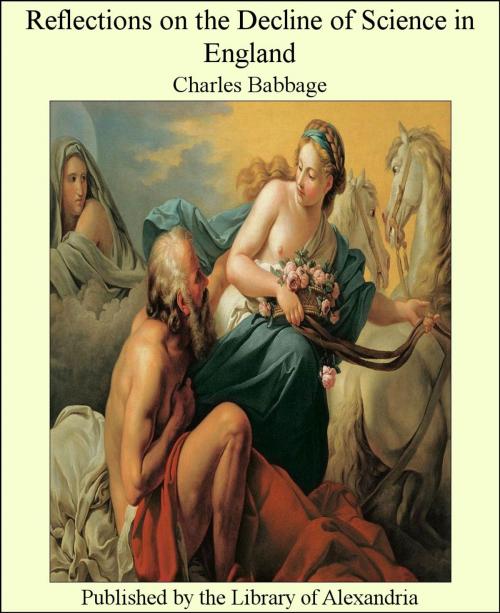Reflections on the Decline of Science in England
Nonfiction, Religion & Spirituality, New Age, History, Fiction & Literature| Author: | Charles Babbage | ISBN: | 9781465526298 |
| Publisher: | Library of Alexandria | Publication: | March 8, 2015 |
| Imprint: | Language: | English |
| Author: | Charles Babbage |
| ISBN: | 9781465526298 |
| Publisher: | Library of Alexandria |
| Publication: | March 8, 2015 |
| Imprint: | |
| Language: | English |
Of the causes which have induced me to print this volume I have little to say; my own opinion is, that it will ultimately do some service to science, and without that belief I would not have undertaken so thankless a task. That it is too true not to make enemies, is an opinion in which I concur with several of my friends, although I should hope that what I have written will not give just reason for the permanence of such feelings. On one point I shall speak decidedly, it is not connected in any degree with the calculating machine on which I have been engaged; the causes which have led to it have been long operating, and would have produced this result whether I had ever speculated on that subject, and whatever might have been the fate of my speculations. If any one shall endeavour to account for the opinions stated in these pages by ascribing them to any imagined circumstance peculiar to myself, I think he will be mistaken. That science has long been neglected and declining in England, is not an opinion originating with me, but is shared by many, and has been expressed by higher authority than mine. I shall offer a few notices on this subject, which, from their scattered position, are unlikely to have met the reader's attention, and which, when combined with the facts I have detailed in subsequent pages, will be admitted to deserve considerable attention. The following extract from the article Chemistry, in the Encyclopaedia Metropolitana, is from the pen of a gentleman equally qualified by his extensive reading, and from his acquaintance with foreign nations, to form an opinion entitled to respect. Differing from him widely as to the cause, I may be permitted to cite him as high authority for the fact. "In concluding this most circumscribed outline of the History of Chemistry, we may perhaps be allowed to express a faint shade of regret, which, nevertheless, has frequently passed over our minds within the space of the last five or six years. Admiring, as we most sincerely do, the electro-magnetic discoveries of Professor Oersted and his followers, we still, as chemists, fear that our science has suffered some degree of neglect in consequence of them. At least, we remark that, during this period, good chemical analyses and researches have been rare in England; and yet, it must be confessed, there is an ample field for chemical discovery. How scanty is our knowledge of the suspected fluorine! Are we sure that we understand the nature of nitrogen? And yet these are amongst our elements. Much has been done by Wollaston, Berzelius, Guy-Lussac, Thenard, Thomson, Prout, and Others, with regard to the doctrine of definite proportions; but there yet remains the Atomic Theory. Is it a representation of the laws of nature, or is it not?"—-CHEMISTRY, ENCYC. METROP. p.596. When the present volume was considerably advanced, the public were informed that the late Sir Humphry Davy had commenced a work, having the same title as the present, and that his sentiments were expressed in the language of feeling and of eloquence. It is to be hoped that it may be allowed by his friends to convey his opinions to posterity, and that the writings of the philosopher may enable his contemporaries to forget some of the deeds of the President of the Royal Society
Of the causes which have induced me to print this volume I have little to say; my own opinion is, that it will ultimately do some service to science, and without that belief I would not have undertaken so thankless a task. That it is too true not to make enemies, is an opinion in which I concur with several of my friends, although I should hope that what I have written will not give just reason for the permanence of such feelings. On one point I shall speak decidedly, it is not connected in any degree with the calculating machine on which I have been engaged; the causes which have led to it have been long operating, and would have produced this result whether I had ever speculated on that subject, and whatever might have been the fate of my speculations. If any one shall endeavour to account for the opinions stated in these pages by ascribing them to any imagined circumstance peculiar to myself, I think he will be mistaken. That science has long been neglected and declining in England, is not an opinion originating with me, but is shared by many, and has been expressed by higher authority than mine. I shall offer a few notices on this subject, which, from their scattered position, are unlikely to have met the reader's attention, and which, when combined with the facts I have detailed in subsequent pages, will be admitted to deserve considerable attention. The following extract from the article Chemistry, in the Encyclopaedia Metropolitana, is from the pen of a gentleman equally qualified by his extensive reading, and from his acquaintance with foreign nations, to form an opinion entitled to respect. Differing from him widely as to the cause, I may be permitted to cite him as high authority for the fact. "In concluding this most circumscribed outline of the History of Chemistry, we may perhaps be allowed to express a faint shade of regret, which, nevertheless, has frequently passed over our minds within the space of the last five or six years. Admiring, as we most sincerely do, the electro-magnetic discoveries of Professor Oersted and his followers, we still, as chemists, fear that our science has suffered some degree of neglect in consequence of them. At least, we remark that, during this period, good chemical analyses and researches have been rare in England; and yet, it must be confessed, there is an ample field for chemical discovery. How scanty is our knowledge of the suspected fluorine! Are we sure that we understand the nature of nitrogen? And yet these are amongst our elements. Much has been done by Wollaston, Berzelius, Guy-Lussac, Thenard, Thomson, Prout, and Others, with regard to the doctrine of definite proportions; but there yet remains the Atomic Theory. Is it a representation of the laws of nature, or is it not?"—-CHEMISTRY, ENCYC. METROP. p.596. When the present volume was considerably advanced, the public were informed that the late Sir Humphry Davy had commenced a work, having the same title as the present, and that his sentiments were expressed in the language of feeling and of eloquence. It is to be hoped that it may be allowed by his friends to convey his opinions to posterity, and that the writings of the philosopher may enable his contemporaries to forget some of the deeds of the President of the Royal Society















